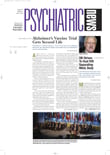As part of the National Depression Management Leadership Initiative, psychiatrists and primary care physicians participating in the project are beginning to use the Patient Health Questionnaire-9 (PHQ-9) as part of routine clinical care.
R. Scott Benson, M.D., a psychiatrist in a group practice in Pensacola, Fla., was an early starter—he began using the PHQ-9 to monitor his patients for depressive symptoms a year before he joined the depression initiative. “I was always looking for a way to measure depression in my patients,” he told Psychiatric News.
The PHQ-9 enables him to track patients' depressive symptoms over time, Benson noted, and gives him an objective way to measure whether they are improving or getting worse.
“Instead of having to go through the whole inventory of depression symptoms,” he said, “I can just look at those symptoms that have changed over time and say to the patient, for example, `I see that you are having more trouble sleeping,'” remarked Benson.
He said he views administering the PHQ-9 to patients as “consistent with [his] professional goals” because it helps him collaborate with patients on their recovery. “I need to work with my patients to help them attain their goals.” He also noted that there is“ enormous” variation in treatment approaches for psychiatric disorders. “As psychiatrists, we need better science to guide what we do,” he said.
Linda Stuart, M.D., a family practice physician in Baton Rouge, La., is also giving the PHQ-9 to patients as part of the National Depression Management Leadership Initiative.
She said that before she joined the study, she queried certain patients about possible depressive symptoms, but not as part of a standardized routine.“ Having the PHQ-9 handy formalizes” depression evaluation, she noted.
Currently, she gives the entire questionnaire to patients she thinks may be depressed. However, she will soon embed the first two questions of the PHQ-9 into a general health questionnaire that new patients and those who come for their annual visit must complete.
The questions ask patients whether over the previous two weeks they have experienced loss of interest or pleasure in their activities and whether they have felt “down, depressed, or hopeless” along a continuum ranging from “not at all” to “nearly every day.” Patients who answer yes to either one of these questions will be asked to complete the entire questionnaire, she said. ▪
